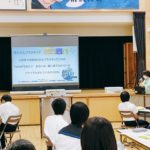Ogawa Econos Inc.
     |
Developing environmental conservation as a core competency and training personnel to promote regional and global environmental conservation |
Targets
12.5 By 2030, substantially reduce waste generation through prevention, reduction, recycling and reuse
7.2 By 2030, increase substantially the share of renewable energy in the global energy mix
3.3 By 2030, end the epidemics of AIDS, tuberculosis, malaria and neglected tropical diseases and combat hepatitis, water-borne diseases and other communicable diseases
6.2 By 2030, achieve access to adequate and equitable sanitation and hygiene for all and end open defecation, paying special attention to the needs of women and girls and those in vulnerable situations
11.6 By 2030, reduce the adverse per capita environmental impact of cities, including by paying special attention to air quality and municipal and other waste management
4.7 By 2030, ensure that all learners acquire the knowledge and skills needed to promote sustainable development, including, among others, through education for sustainable development and sustainable lifestyles, human rights, gender equality, promotion of a culture of peace and non-violence, global citizenship and appreciation of cultural diversity and of culture’s contribution to sustainable development
12.8 By 2030, ensure that people everywhere have the relevant information and awareness for sustainable development and lifestyles in harmony with nature
8.2 Achieve higher levels of economic productivity through diversification, technological upgrading and innovation, including through a focus on high-value added and labour-intensive sectors
Initiative details
Working towards our goal of a recycling-oriented society, our business involves the conversion of waste into resources and fuel, the management of septic tanks to purify sewage, and the maintenance and management of sewage treatment plants.
In order to reduce the amount waste by reusing it, our fuel manufacturing business produces fuels by turning plastic, paper, wood, and fiber waste into RPF (*2) and construction waste, etc. into wood chips. These recycled fuels are then supplied to power generation companies and customers that generate their own power. We are also creating renewable energy through the use of solar power and binary power generation, which uses waste heat from incineration facilities.
Our water quality preservation business works to reduce environmental impact (preventing pollution of rivers and oceans) by providing maintenance and management services for septic tanks and sewage treatment facilities, as well as conducting ozone sterilization to ensure hygienic, safe, and secure spaces.
Our resource recycling business, meanwhile, is exploring alternative treatment methods to landfill and incineration, such as fuel conversion and recycling, with the aim of achieving a 100% waste recycling rate. Also, by helping with the separation of waste and buying back materials, we are cooperating with local resource recovery efforts and promoting the reuse of resources. Furthermore, we are working to reduce pollution of the atmosphere by setting voluntary environmental standards for incineration exhaust gases that are stricter than the legal limits.
We also put a great deal of effort into developing human resources. In order to bring up individuals who will protect the local environment, we provide environmental education to children from the perspectives of the 3Rs, dietary education, and the water environment, combining seeing (observation), doing (hands-on experience), and thinking (learning). In addition, we established the ECONOS SEED Meister certification system to award children who set environmental action goals by conducting environmental education activities that involve seeing (observation), doing (hands-on experience), and thinking (learning). This helps to support children’s independent environmental initiatives (activities).
-1024x576.jpg)
-1024x576.jpg)
-1024x576.jpeg)
We are also working to create a comfortable workplace. By changing from a hierarchical structure to one that is borderless, flat, and open, we aim to create a workplace based on respect, trust, empathy, and cooperation. In addition, we encourage employees to demonstrate their abilities by participating in various community service activities, such as road cleaning, environmental education, and illegal dumping removal, giving them a sense of fulfillment and satisfaction in their work.
Key Points
Our slogan is “Bringing Change with the 2030 SDGs.” The entire company is involved in this initiative, with management taking the lead.
Our SDGs 2030 VISION sets targets for fiscal 2030 regarding the amount of wood chips produced and the amount of waste disposed of in landfills, etc., and we are striving to achieve these targets through the integration of the environment and our business.
We are also committed to outreach. For example, our CSR report, which has been published annually since 2005, includes information on our initiatives and the SDGs and is distributed to business partners, financial institutions, plant tour participants, and visitors. Our website, meanwhile, features a special SDGs page to disclose information on our SDG action pledge, initiatives, and more. Furthermore, we are continuing our company-wide activities to achieve the SDGs by publicizing our initiatives via business magazines, TV commercials, newspapers, and billboards.
(*2) RPF (Refuse Paper and Plastic Fuel): High-grade solid fuel made mainly from recovered paper and plastics, which are industrial waste considered difficult to recycle into materials
Ogawa Econos Inc.
502-10 Takagicho, Fuchu
+81-0570-002-998
Tags associated with this article




